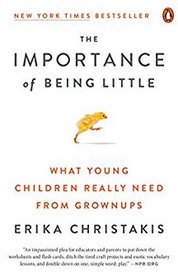Search -
The Importance of Being Little: What Preschoolers Really Need from Grownups
The Importance of Being Little What Preschoolers Really Need from Grownups
Author:
A bold challenge to the conventional wisdom about early childhood, with a pragmatic program to encourage parents to rethink how and where young children learn best — — Parents of young children today are in crisis: Pick the ?wrong? preschool and your child won?t get into the ?right? college. But our fears are misplaced, according to Yale early c... more »
Author:
A bold challenge to the conventional wisdom about early childhood, with a pragmatic program to encourage parents to rethink how and where young children learn best — — Parents of young children today are in crisis: Pick the ?wrong? preschool and your child won?t get into the ?right? college. But our fears are misplaced, according to Yale early c... more »
ISBN-13: 9780525429074
ISBN-10: 0525429077
Publication Date: 2/9/2016
Pages: 384
Rating: ?
ISBN-10: 0525429077
Publication Date: 2/9/2016
Pages: 384
Rating: ?
0 stars, based on 0 rating
Publisher: Viking
Book Type: Hardcover
Other Versions: Paperback
Members Wishing: 7
Reviews: Amazon | Write a Review
Book Type: Hardcover
Other Versions: Paperback
Members Wishing: 7
Reviews: Amazon | Write a Review
Genres:




